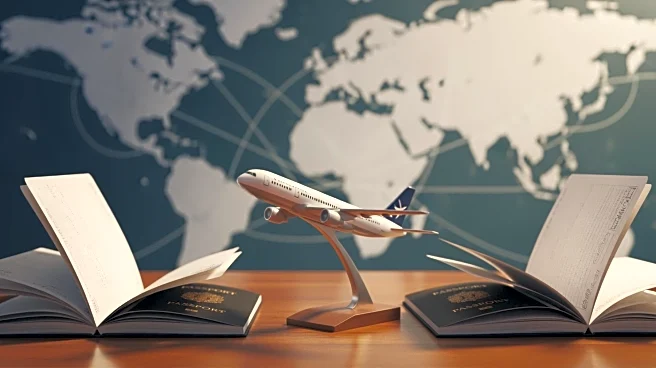What's Happening?
A Wells Fargo banker, Mao Chenyue, who had been barred from leaving China, has been allowed to return to the United States. This development follows negotiations between U.S. and Chinese officials. Mao, a naturalized U.S. citizen born in China, was placed under an exit ban by Chinese authorities after traveling to the country before July. The case is part of a broader issue where U.S. citizens have been blocked from leaving China, contributing to tensions in U.S.-China relations. The State Department emphasized the safety and security of U.S. citizens as a priority. Adam Boehler, President Trump's special envoy for hostage response, highlighted the administration's high-level engagement in securing Mao's release. The release comes as President Trump plans to meet with Chinese President Xi Jinping, amid ongoing diplomatic efforts to address trade tariffs.
Why It's Important?
The release of Mao Chenyue underscores the ongoing diplomatic challenges between the U.S. and China, particularly concerning the use of exit bans on American citizens. These bans have been a significant irritant in bilateral relations, affecting many Americans, especially those of Chinese heritage. The resolution of such cases is crucial for maintaining diplomatic ties and ensuring the safety of U.S. citizens abroad. The incident also highlights the broader geopolitical dynamics, as the U.S. seeks to negotiate trade agreements with China. The administration's focus on resolving these issues reflects its commitment to protecting American citizens and addressing trade barriers.
What's Next?
The release of Mao Chenyue may set a precedent for future negotiations involving U.S. citizens detained abroad. As President Trump prepares to meet with President Xi Jinping, the focus will likely remain on resolving trade disputes and addressing the use of exit bans. The U.S. may continue to leverage diplomatic channels and executive orders to secure the release of Americans detained without justification. The outcome of these negotiations could influence future U.S.-China relations and impact trade policies.
Beyond the Headlines
The use of exit bans by China raises ethical and legal questions about the treatment of foreign nationals and the transparency of legal processes. The situation highlights the need for clear international protocols to protect individuals' rights while abroad. The broader implications of such practices could affect international business operations and the willingness of foreign nationals to travel to or conduct business in China.








